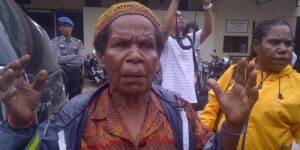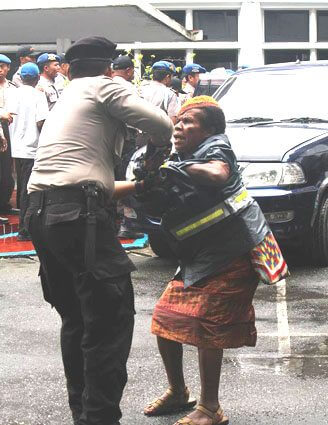Yosepha Alomang (Mama Yosepha) is an indigenous woman from the Indonesian province of Irian Jaya (West Papua), one of the most biologically diverse places on the planet. She is physically small, but she has bravely stood up to powerful interest groups in defense of her people’s right to their land. Yosepha lived with her family in Tsinga village, Tembagapura, Mimika, a hillside area, until the mid-1950s, when a local church that provided health and education in the remote areas of Papua encouraged them to move near the south coast. As a little girl, Yosepha went to elementary school, but she dropped out in the fourth grade after the death of her parents. She recalls her first encounter with Freeport McMoran, the world’s biggest gold mine, located in Timika. It was in 1967. She was 17, too young to understand what was going on. But when she thinks about it now, she says:
“They took our land. They didn’t even ask our permission. I was just a young girl. I remember my father gave them the land.” — Yosepha Alomang
The naïve Amungme people did not know that that it would be the beginning of decades of suffering as their once pristine natural environment would slowly deteriorate. She vividly recalls the day Freeport came.
“One day, a group of men came to our house. They talked with my parents. I hardly remember their conversation. They were warning my father to follow the company’s request. They said if we wanted to eat well, we had to make sure that they could eat well also.” — Yosepha Alomang
About a dozen men and several tribal leaders agreed to deal with the company and left their land, but many refused. Those who refused faced arrest and torture by the state apparatus, but many were killed or chased away to live in the forests. Yosepha says of the state and non-state actors:
“They came and killed our people.” At that time nobody cared about the fate of the Amungmes. “I don’t understand why the Indonesian government could be so harsh.” — Yosepha Alomang
Human rights violations are rampant in Timika and Yosepha has been detained several times for protesting either against the mining company or the military that backs it up.
She was proposed to the Nobel Peace Price 2005. She was awarded the Goldman Environmental Prize in 2001, for her efforts on organizing her community to resist the mining company Freeport-McMoRan’s mining practices over three decades that have destroyed rainforests, polluted rivers, and displaced communities. Her resolve has been tested for decades.
In the early 1970s, she was detained for organizing her tribe to protest against what the unfair occupation of their land. A part of the land mined by Freeport is a hill that the tribes’ ancestors consider to be sacred. Freeport cut into it to mine copper, causing irreparable damage and years of pain and suffering.
“Many women were raped and families lost their loved ones,” Yosepha reports. “I was protesting these crimes. I went to jail several times. Once I was detained for a month in a container van by the military. General Sutrisno released me when he visited Papua for a mission. I just can’t sit still seeing oppression against my people.” — Yosepha Alomang
Yosepha and her group kept up their protests and even sued the company in court for destroying their land. She believed that this way she could motivate many other people to act. And she was vindicated. In 1976, a big riot occurred in a Freeport site in Tembagapura, a mining town. The protesters burned down a factory. The mêlée served as a wakeup call for the government, which finally began to realize that something was wrong. At the time, Yosepha had already become “public enemy number one” to those who were disturbed by her activism.
She recalls that one night, she and her husband were dragged out of bed by soldiers.
“We were tortured like animals, beaten up and degraded with vile language“ — Yosepha Alomang
She was quoted as saying in a report on human rights violations in Timika prepared by Jayapura bishop Monsignior Herman, OFM. For two weeks, Yosefa and her husband, Markus Kwalik, were detained in a room fill with human feces. Tortures and other degrading treatment failed to bring her down.
 She continued to organize women to protest against the large-scale mining that had ruined their culture, environment and health. She organized a group of mothers for human rights. These informal groups met regularly. Down the road, the groups organized into a network called Yahamak, an NGO. Yosepha is reluctant to talk about politics. She does not regard what she is doing for her tribe in Timika as political work. She would rather talk about freedom.
She continued to organize women to protest against the large-scale mining that had ruined their culture, environment and health. She organized a group of mothers for human rights. These informal groups met regularly. Down the road, the groups organized into a network called Yahamak, an NGO. Yosepha is reluctant to talk about politics. She does not regard what she is doing for her tribe in Timika as political work. She would rather talk about freedom.
“Many people speak of freedom. But what is freedom for Papuans? Freedom is when people are educated, when people are free from poverty and sufferings. That’s freedom in our language.” — Yosepha Alomang
Read more about the struggle of our indigenous sisters and brothers, visit: Free West Papua Campaign
Sign the petition to demand West Papua access to human rights inspectors!
Gata Malandra
Latest posts by Gata Malandra (see all)
- Event: World Crew Battle UK By Swatch — October 11, 2017
- Knowledge Session: Who Was Manco Inca? — May 4, 2017
- Video + Letra: Illmani ‘Saber es Poder’ — February 3, 2017

